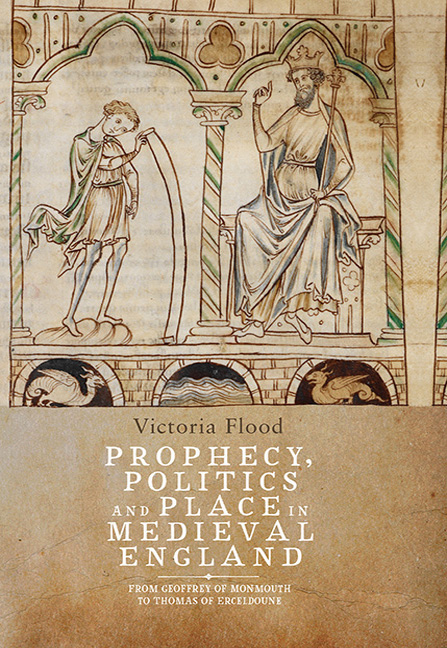Book contents
- Frontmatter
- Dedication
- Contents
- List of Illustrations
- Acknowledgements
- Abbreviations
- Introduction: An Island of the Ocean
- 1 ‘Cadualadrus Conanum uocabit’: Political Prophecy in England, the Welsh March, and Ireland, c. 1130s–1260s
- 2 ‘E si finerount les heirs d'engleterre hors de heritage’: Galfridian Prophecy and the Anglo-Scottish Border, c. 1301–30s
- 3 ‘Whan shal this be?’ The English Erceldoune Tradition, c. 1310s–90s
- 4 ‘A dede man shall make bytwene hem acorde’: Cock in the North and Ceiliog y North, c. 1405–85
- Conclusion
- Bibliography
- Index
1 - ‘Cadualadrus Conanum uocabit’: Political Prophecy in England, the Welsh March, and Ireland, c. 1130s–1260s
Published online by Cambridge University Press: 09 May 2017
- Frontmatter
- Dedication
- Contents
- List of Illustrations
- Acknowledgements
- Abbreviations
- Introduction: An Island of the Ocean
- 1 ‘Cadualadrus Conanum uocabit’: Political Prophecy in England, the Welsh March, and Ireland, c. 1130s–1260s
- 2 ‘E si finerount les heirs d'engleterre hors de heritage’: Galfridian Prophecy and the Anglo-Scottish Border, c. 1301–30s
- 3 ‘Whan shal this be?’ The English Erceldoune Tradition, c. 1310s–90s
- 4 ‘A dede man shall make bytwene hem acorde’: Cock in the North and Ceiliog y North, c. 1405–85
- Conclusion
- Bibliography
- Index
Summary
The story of political prophecy in England began in Oxford, where Geoffrey of Monmouth, a Normanised cleric with a familiarity with the political function of Welsh language prophecy, composed the foundational text in the English prophetic canon: the Prophetiae Merlini. In the Prophetiae, Geoffrey reworked a long-lived tradition of Welsh prophecy engaged with a threefold historical progression: from the unity of the (legendary) British past to a period of oppression under Saxon domination, followed by Saxon overthrow and the restoration of British supremacy. This formed the very basis of his understanding of the island of Britain as a single coherent territory, belonging to a single people, and under single governance. However, for Geoffrey the rightful heirs to the island were not the insular Britons, the Welsh, but the Norman rulers of England, and their time was not to come, it was already here.
We can understand Geoffrey's political-literary activity, borrowing a useful phrase from the philosopher and cultural theorist Slavoj Žižek, as a historical intervention: a revisiting and rewriting through which ‘the scene from the past become(s) what it always was’. For Geoffrey, British prophecy was fulfilled in Norman history: his manipulation of Welsh themes recreates British prophecy as in some sense always about the coming of the Normans, and suggests that the previous meanings of these ciphers rested on a profound misrecognition. And yet as we shall see, in an earlier and continuing Welsh oppositional context, this same vision of pan-insular sovereignty articulated a contemporary threat to Norman hegemony of which both Geoffrey and his earliest readers were keenly aware. British prophecy and the insular future it conveyed were resistant to the imposition of a singular hegemonic meaning. This was an instability Geoffrey exploited in a work which was at once highly jingoist and deeply pessimistic. Nonetheless, even in its pessimism the Prophetiae was intended to speak to the interests of a political elite in England.
The Prophetiae saw a rapid and widespread reception. Alongside the 217 surviving manuscripts of Geoffrey's history of the legendary British past, the Historia Regum Britanniae, in which it appears as Book VII, the Prophetiae survives as a separate text in seventy-six (catalogued) manuscripts, often paired with later Latin prophecies inspired by it. It also appears inserted in a number of other chronicles and histories.
- Type
- Chapter
- Information
- Prophecy, Politics and Place in Medieval EnglandFrom Geoffrey of Monmouth to Thomas of Erceldoune, pp. 18 - 65Publisher: Boydell & BrewerPrint publication year: 2016



